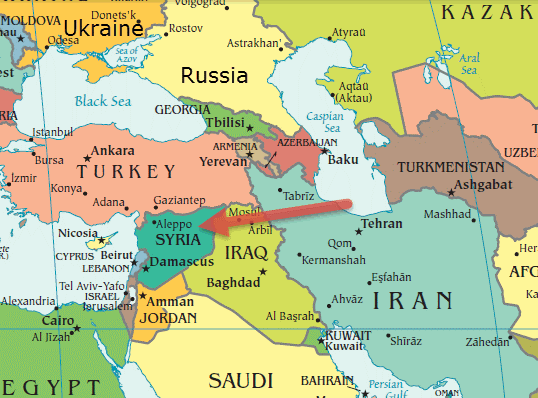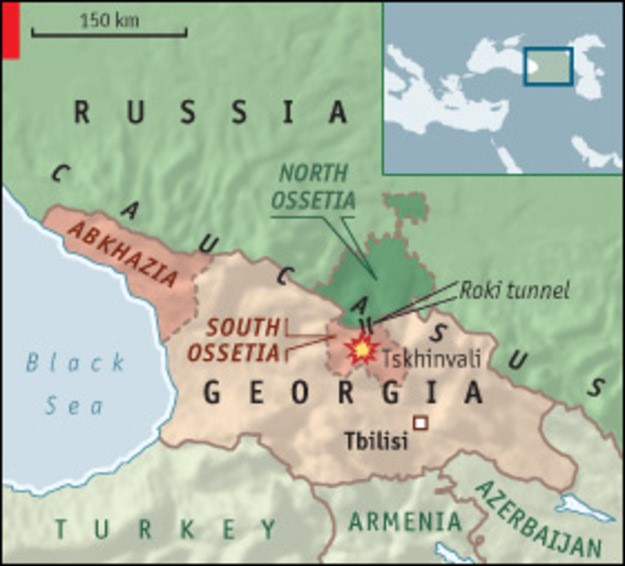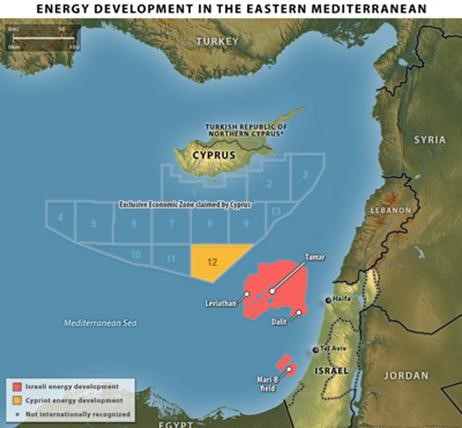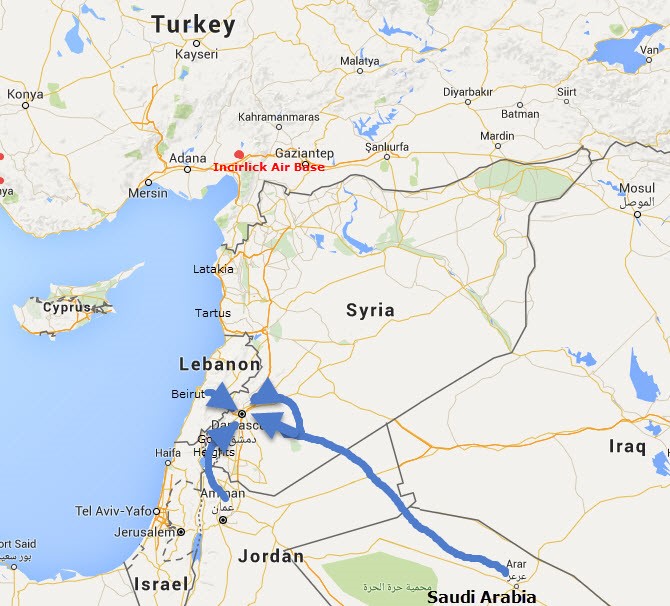|
Russia and the Middle East
Barry Setterfield, March 6, 2016
March 14, 2016 update
Question and Response

Many in Israel and elsewhere feel that the rise of Russian dominance in Syria is either leading to a scenario with Isaiah 17 (with its wipe-out of Damascus, the capital of Syria), or the events that trigger Ezekiel 38 (with an invasion of Israel headed up by Iran and, probably, Russia), or both. Here is a brief review these recent events in one-sentence summaries.
- In early 2014, Russia annexed Crimea from the Ukraine; the Crimean naval base at Sebastopol is now Russia's only warm water port. see map below
- On 11th October 2014, Russia installed tactical nuclear weapons in the Crimea and Eastern Ukraine.
- On 24th November 2014, an agreement with Abkhazia, near Turkey's border, effectively annexed that country to Russia. Abkhazia has passes over the Caucasus mountain range. see map below
- Europe and NATO (including Turkey) responded to these moves by placing economic sanctions on Russia.
- Russia responded by cutting off oil and gas supplies to Europe and Turkey that went through eastern Ukrainian pipelines.
- Europe began active plans to get oil and gas pipelines from Saudi Arabia and Iraq to the Mediterranean, necessitating transit through Syria.
- Syrian President Assad,supported by Iran, was about to be overthrown by rebels; both countries have treaties with Russia.
- Assad and Iran both oppose the oil pipeline through Syria; Russia could block the building of the pipeline by supporting Assad and Iran.
- In supporting Assad and Iran, Russia gained partial control of oil and gas outlets to Europe and Turkey.
- Turkey now must destroy the Assad regime in Syria, as Turkey's ambition is to control the Mid-East, denying control to Iran.
- Saudi Arabia tries to limit Iranian influence in Yemen, Syria and other places, so she can survive against Iranian expansion and oil sales.
- In 2015, Russia begins using its warships in the Black Sea (from Sebastopol) to fire cruise missiles at Syrian rebel targets, in support of Assad.
- On 18th March 2015, Russia annexes South Ossetia with its key Roki Tunnel which is the only access through (instead of over) the Caucasus. see map below
- On 14th November 2015, Russia deploys troops, long range air defense missiles and war planes to two bases in Syria.
- By late 2015, Russia is starting to re-establish Assad’s control over Syria.
- In the meantime, between 2011 - 2016, Israel, Cyprus and Egypt had found significant gas (& oil) reserves in the Mediterranean (in Israeli and Cypriot territory) and in the Golan Heights. see map below
- On 31st January 2016, a 1.3 billion dollar agreement is made between Israel and Turkey to get a gas pipeline to Turkey.
- February 2016, a Tripartite agreement is signed by Greece, Israel, and Cyprus to get oil and gas pipelines connected, tapping into the recent discoveries. Turkey and Egypt have been invited to join this agreement.
- This ruins Russian plans to control oil and gas supplies to the eastern Mediterranean countries. (This may set up Israel to become targeted.)
- 9th February 2016, Saudi Arabia, Turkey and the UAE make plans to send troops to Syria to dislodge Assad and the Russians, and to level Damascus.
- 16th February 2016, Saudi Arabia, Turkey and the UAE coordinate military activities to achieve goals in Syria in an operation called “Northern Thunder.”
- 23rd February 2016, Turkey-Saudi-UAE coalition plans to use upcoming Syrian cease-fire to send troops disguised as tourists/refugees into strategic points to attack Syria. see map below
- On 25th February 2016, Russia puts 8500 troops, planes and missiles into Armenia as part of its alliance with Armenia, threatening Turkey.
- 25th February 2016, the former US Ambassador to the UN, John Bolton, made the comment that the Russians know they must complete their expansion plans before the USA elections place a new President in office in January 2017.
- As of today, March 6, 2016, the Syrian cease-fire is in effect with minor skirmishes still in evidence.




March 14, 2016 update
On Monday 14th March 2016, Russia’s leader ordered the start of a withdrawal of Russian forces from Syria. Many have heaved a sigh of relief and said that the wipe-out of Damascus in Syria (as in Isaiah 17) and the Gog-Magog battle in Israel (as in Ezekiel 38) will not happen. However, we need to be careful to read what Mr. Putin of Russia did and did not say. Here is a 5 point Summary of the situation.
- The Russian proposed withdrawal is only partial.
- Troops and equipment will remain at the two major bases which the Russians have set up.
- The proposed withdrawal will put pressure on Assad to negotiate some peace agreement.
- Diplomats point out that similar Russian promises have not been fulfilled at other times.
- For example, in the Eastern Ukraine, Russia similarly promised to pull out its troops. Some indeed moved out while others moved in elsewhere. They are now nuclear armed.
Here are some key paragraphs from the article itself.
Russia's Putin Orders Start of Russian Forces' Withdrawal from Syria
Russian forces had largely fulfilled their objectives in Syria, Putin said. But he gave no deadline for the completion of the withdrawal and said forces would remain at a seaport and airbase in Syria's Latakia province.
Russia's U.N. ambassador Vitaly Churkin confirmed some forces would stay in Syria. "Our military presence will continue to be there, it will be directed mostly at making sure that the ceasefire, the cessation of hostilities, is maintained," he told reporters at the United Nations in New York.
Moscow gave Washington no advance warning of Putin's announcement, two U.S. officials said. Speaking on condition of anonymity, they added that they had seen no indications so far of preparations by Russia's military for the withdrawal.
The move was announced on the day United Nations-brokered talks involving the warring sides in Syria resumed in Geneva.
Rebels and opposition officials alike reacted sceptically.
A European diplomat was also sceptical. "It has the potential to put a lot of pressure on Assad and the timing fits that," the diplomat said. "However, I say potentially because we've seen before with Russia that what's promised isn't always what happens."
Questions and responses regarding this material are below.
Question: Who or what are Gog and Magog today? (March 8, 2016)
Response: A brief analysis of the text of Ezekiel 38 and 39 gives some hints. In 39:2 it says that they are from the "uttermost north" of Israel. If you go due north of Israel to the uttermost north, you end up in Russia. Go due north of Jerusalem and you come to Moscow. Indeed, the mountain range which defines the southern border of Russia on the east of the Black Sea is the Caucasus. This word literally means "Gog's Fort".
Further analysis of the text indicates that Gog is probably the commander and Magog is the land from which he and his army comes. It literally reads in 38:2 "Gog from the land of Magog, prince of Rosh, Meshech and Tubal.' So Gog is the prince over the land of Rosh, Meshech and Tubal. These are the names of ancient tribes who inhabited the land of Magog. The word Meshech is the old root from which we get the word Moscow. Rosh is the root for "Russian". Tubal is the tribal name from which the old eastern capital of Russia, namely Tobolsk, gets its name.
In 38:5 and 6 we get the names of those who come with Russia against Israel. The first of these is Persia, or modern day Iran. This is the present alliance with Syria. In verse 6 the word Togarmah is enshrined today in the Turkoman republic and Gomer is all the surrounding "Stans" namely Turkmenostan, Uzbekistan Khazakstan etc. The word in Hebrew which has been translated as "Libya" in some Bibles in verse 5 is literally Phut or Put which was a Persian tribe. It is from that word that we get the name of their language Pharsee or Parsee.
That finally leaves the question of who Ethiopia is. Interestingly, both the Hebrews and the Greeks had two "Ethiopias" or their equivalent. There was the eastern and the western. This word in Greek "aethi-opsis" literally means "burnt faces" or dark-skinned peoples. Herodotus the Greek historian stated that the Eastern Ethiopians had straight hair while the western Ethiopians had "wooly" or frizzy hair. Thus the western Ethiopia is the one we know today in Africa. The Eastern one, however, is the one associated with Persia (Iran) and is the region we know as Afghanistan and Pakistan..
This is basically the line-up we have in the Mid-East today. So Ezekiel 38 can be fulfilled at any time. Analysis seems to indicate that Ezekiel 39 is a separate battle involving a return of Russia and allies at Armageddon. In Daniel 11:44, Antichrist hears news out of the uttermost North (Russia) and out of the East (China) mobilizing to come against him in Jerusalem and fight the battle of Armageddon.
But on this earlier occasion the associated passages in Isaiah 17, Zechariah 9-11, Zehaniah 2 and elsewhere, the coming of the huge army is in the context of the Damascus wipe-out in which Israel somehow gets involved. Israel comes back from that battle in twos and threes. Then Isaiah 17:12-14 says that these nations will rush against Israel to wipe her out when she is at her weakest. But God intervenes. In Zechariah 9:14 it says that God will appear over them and blows the trumpet. This is reiterated in Zephaniah 2:9 in the ancient LXX version. There is only one time in the New Testament when we are told that God blows the Trumpet, as distinct from the angelic trumpets; that is for the Rapture. So our time may be short.
There is one final point. The text in Ezekiel 38:13 says that Sheba, Dedan (Saudi Arabia) and the merchants of Tarshish ask Russia why she is coming. Tarshish has been a point of contention as to its location and who are involved. So I went again to the most ancient version of the Scriptures we have, written about 280 BC. That version does not read Tarshish. Instead it reads "Chalcedon". That was the ancient name for Istanbul in Turkey before it became Constantinople. So Turkey and Saudi Arabia are not with the Russians, but against them. It is interesting that it is the alliance between Turkey and Saudi Arabia which is preparing events in Syria and Damascus right now.
|




